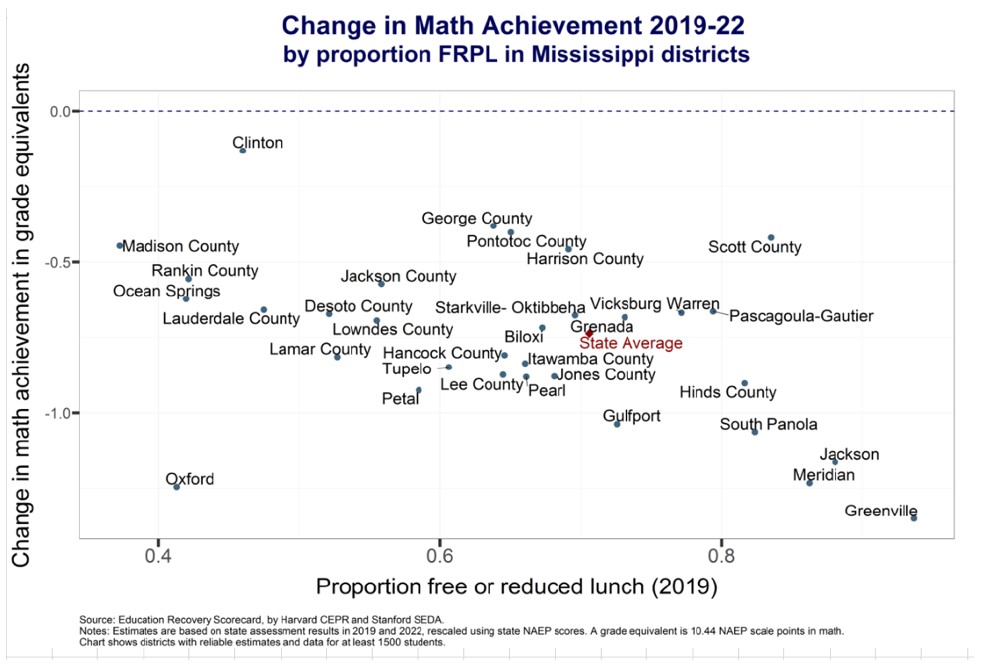Mississippi News
Report shows learning loss for Mississippi kids
New report shows learning losses for Mississippi students at district level, indicating wide disparities
Mississippi students have lost three-quarters of a school year in math instruction since the start of the pandemic, according to a new report released last week.
The Education Recovery Scorecard, produced by researchers at Harvard and Stanford, looks at learning loss at the district level across the country using a combination of state and national test scores.
Every state is required to administer annual standardized tests, but the results cannot be easily compared because they are not required to test for the same content or use the same grading scale. To prepare the report, researchers took state test data from 29 states and standardized the scoring systems using the results from the 2022 National Assessment for Educational Progress.
The report measured learning loss in terms of the percentage of a school year that students are behind, compared to the amount of learning that would typically occur during a single school year.
READ MORE: Mississippi students see decline in reading and math on national exam
Nationally, the study found the average student lost the equivalent of half a year of math instruction and a quarter of a year in reading. In Mississippi, it was three-quarters of a year of math instruction and a quarter of a year in reading.
Thomas Kane, director of the Harvard Center for Education Policy Research, said the goal was to give educators and parents nationally comparable information about learning loss in their local district.
The interactive graphs in the report show no districts in Mississippi surpassed their 2019 performance in math or reading, but the severity of achievement loss varied widely by district.

“This is a large increase in educational inequity,” Kane said in reference to the graph of changes in math achievement in Mississippi. “It’s not just saying ‘High poverty districts have always scored lower than low poverty districts.’ This is saying that those gaps, which existed in 2019, have gotten a lot wider.”
He added most states saw this pattern, but varied in the degree to which they widened.
Since 90% of federal pandemic relief funds are being spent at the district level, Kane said it was important to have high quality district-level data to inform those spending decisions.
“What we hope is that states and districts will use these data to revisit their recovery plans,” Kane said. “The districts that lost more than a year’s worth of instruction should be thinking ‘Do we have enough tutoring, double doses of math instruction, (and) summer school to make up for these losses?’”
The magnitude of federal recovery dollars currently available gives him hope that these learning losses can be adequately addressed, Kane said, if districts are willing to make adjustments now that they know the full scope of their losses.
READ MORE: How much pandemic relief funds has your school district spent?
Kane added that these results should be alarming not just for educators, but for mayors and community organizations that can also play a role in helping students catch up. He pointed out that the learning losses are likely not the result exclusively of what happened in schools, but of many other community factors like broadband connectivity, hospitalization rates, and whether parents were able to work from home.
“It won’t be just what schools do or don’t do that determine whether or not Mississippi students catch up,” he said.
This article first appeared on Mississippi Today and is republished here under a Creative Commons license.
Mississippi News
Suspect in Charlie Kirk assassination believed to have acted alone, says Utah governor
SUMMARY: Tyler Robinson, 22, was arrested for the targeted assassination of conservative activist Charlie Kirk in Orem, Utah. Authorities said Robinson had expressed opposition to Kirk’s views and indicated responsibility after the shooting. The attack occurred during a Turning Point USA event at Utah Valley University, where Kirk was shot once from a rooftop and later died in hospital. Engravings on bullets and chat messages helped link Robinson to the crime, which was captured on grim video. The killing sparked bipartisan condemnation amid rising political violence. President Trump announced Robinson’s arrest and plans to award Kirk the Presidential Medal of Freedom.
The post Suspect in Charlie Kirk assassination believed to have acted alone, says Utah governor appeared first on www.wjtv.com
Mississippi News
Americans mark the 24th anniversary of the 9/11 attacks with emotional ceremonies
SUMMARY: On the 24th anniversary of the 9/11 attacks, solemn ceremonies were held in New York, at the Pentagon, and in Shanksville to honor nearly 3,000 victims. Families shared personal remembrances, emphasizing ongoing grief and the importance of remembrance. Vice President JD Vance postponed his attendance to visit a recently assassinated activist’s family, adding tension to the day. President Trump spoke at the Pentagon, pledging never to forget and awarding the Presidential Medal of Freedom posthumously. The attacks’ global impact reshaped U.S. policy, leading to wars and extensive health care costs for victims. Efforts continue to finalize legal proceedings against the alleged plot mastermind.
The post Americans mark the 24th anniversary of the 9/11 attacks with emotional ceremonies appeared first on www.wcbi.com
Mississippi News
Hunt for Charlie Kirk assassin continues, high-powered rifle recovered
SUMMARY: Charlie Kirk, conservative influencer and Turning Point USA founder, was fatally shot by a sniper during a speech at Utah Valley University on September 10, 2025. The shooter, believed to be a college-aged individual who fired from a rooftop, escaped after the attack. Authorities recovered a high-powered rifle and are reviewing video footage but have not identified the suspect. The shooting highlighted growing political violence in the U.S. and sparked bipartisan condemnation. Kirk, a Trump ally, was praised by political leaders, including Trump, who called him a “martyr for truth.” The university was closed and security heightened following the incident.
The post Hunt for Charlie Kirk assassin continues, high-powered rifle recovered appeared first on www.wjtv.com
-
News from the South - Arkansas News Feed7 days ago
‘One Pill Can Kill’ program aims to reduce opioid drug overdose
-
News from the South - Alabama News Feed7 days ago
Alabama lawmaker revives bill to allow chaplains in public schools
-
News from the South - Arkansas News Feed7 days ago
Arkansas’s morning headlines | Sept. 9, 2025
-
News from the South - Texas News Feed7 days ago
‘Resilience and hope’ in Galveston: 125 years after greatest storm in US history | Texas
-
News from the South - Missouri News Feed6 days ago
Pulaski County town faces scrutiny after fatal overdose
-
News from the South - Arkansas News Feed6 days ago
Group in lawsuit say Franklin county prison land was bought before it was inspected
-
News from the South - Kentucky News Feed5 days ago
Lexington man accused of carjacking, firing gun during police chase faces federal firearm charge
-
The Center Square6 days ago
California mother says daughter killed herself after being transitioned by school | California




















































